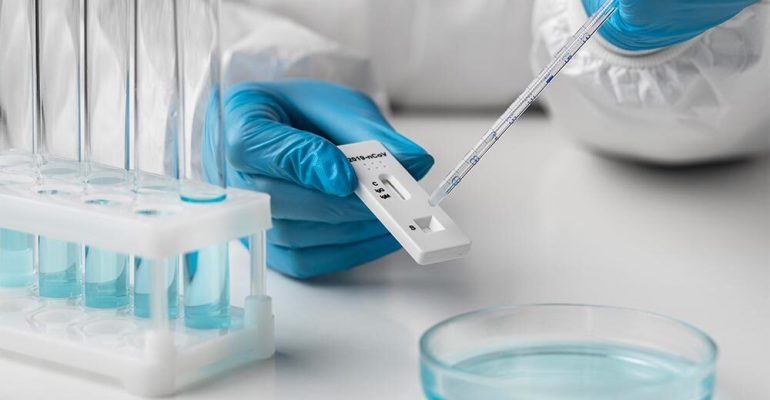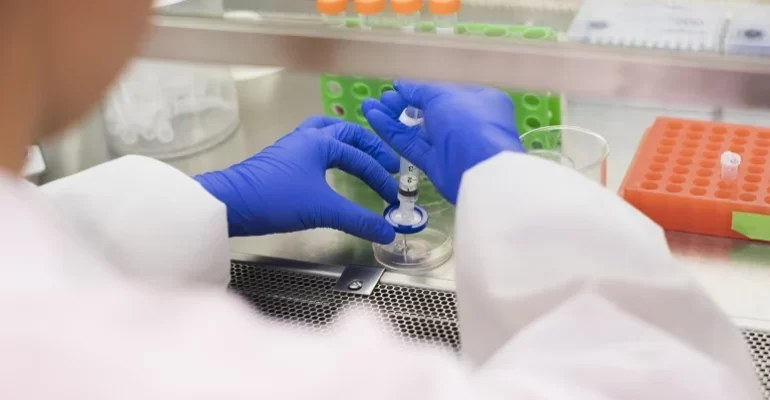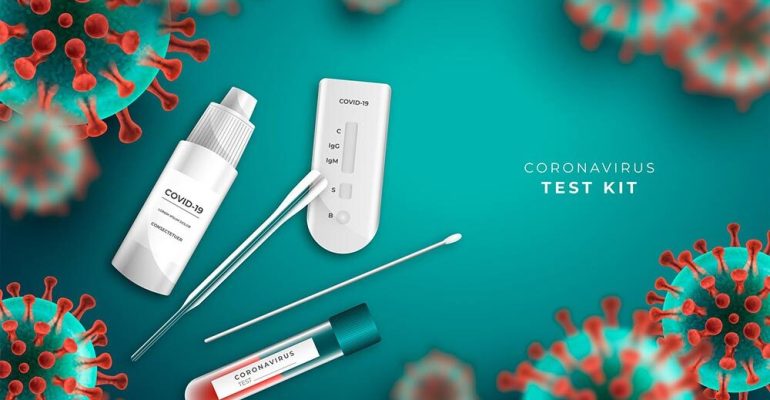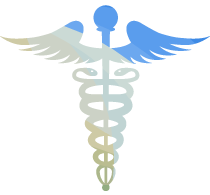Laboratory Testing Strategies by WHO for COVID-19
Have Any Questions?
If you have any query or looking for the best medical laboratory then Bio Covid Lab is always there. feel free to Contact.
Molecular / PCR Testing Process
Molecular tests detect genetic material – the RNA – of the coronavirus and are sensitive enough to need only a very tiny amount of it.
The sample is collected with a nasal or throat swab and they tend to take hours to provide results.
Molecular COVID-19 tests are designed to detect an active infection with SARS-CoV-2, the coronavirus that causes COVID-19.
The most well-known molecular test uses a laboratory method known as reverse transcription polymerase chain reaction (RT-PCR) that is often called PCR.
PCR and molecular tests work by looking for the virus’s genetic material in your test sample, which is usually taken by swabbing your nose or throat. Molecular tests analyzed by a laboratory are generally considered to be the most accurate method of diagnosing COVID-19.
Specimen
Nasopharyngeal / Oropharyngeal Swab
What the test will look for
Nucleic acids ie. RNA of Covid-19 Virus
Laboratory Testing
Molecular / PCR Testing of Covid-19 in Lab



Nasal samples are collected and tested for antigens, which are found in the SARS-CoV-2 virus. It can be even performed outside the conventional laboratory setting. This test is used to quickly obtain a diagnostic result.
This test is a rapid chromatographic immunoassay for the qualitative detection of specific antigens to SARS-CoV-2 present in the human nasopharynx. It provides only an initial screening test result. More specific alternative diagnosis methods should be performed in order to obtain the confirmation of SARS-CoV-2 an infection like COVID 19 PCR.
This test is a rapid chromatographic immunoassay for the qualitative detection of specific antigens to SARS-CoV-2 present in the human nasopharynx. It provides only an initial screening test result. More specific alternative diagnosis methods should be performed in order to obtain the confirmation of SARS-CoV-2 an infection like COVID 19 PCR.
When Should I get Molecular test?
For diagnosis, an antigen test is most often used when PCR tests are not readily available. In these situations, a positive antigen test can be used to diagnose COVID-19 if your symptoms are strongly indicative of the disease.
- Close contact with someone who has COVID-19.
- Attended large social gatherings or otherwise been in places at high risk for virus transmission.
- Either live or work in places where many people live together such as nursing homes, or correctional facilities.
- Need proof of a negative test in order to travel, work, or engage in other activities.
Because there are many different applications of molecular COVID-19 tests, your doctor can best explain whether this kind of testing is appropriate in your situation.
It is also important to note that who should get tested with a PCR or other molecular test can depend on available testing capacity in your area. When resources for testing are limited, certain uses of testing may be prioritized.
Frequently Asked Questions
The frequently asked questions (FAQs) on this page are for a general public or consumer audience.
A positive test result means that you most likely have COVID-19 now and should self-isolate: stay home, separate yourself from others, and take precautions to reduce the risk of spreading the virus, including using a face covering and practicing good hand hygiene and physical distancing. If your symptoms get worse, you should contact your local health care provider by phone.
Molecular tests are designed to detect the presence of SARS-CoV-2 by measuring very small amounts of the virus’s genetic material.
To conduct the test, genetic material is isolated from your test sample and then is copied many times. That genetic material can be analyzed for traces of SARS-CoV-2, and, because of the copying process, even small amounts can be detected.
Nucleic acids are the genetic material that is analyzed, and the copying process is known as amplification. For that reason, nucleic acid amplification testing (NAAT) is the technical name for this kind of molecular testing.
There are various types of laboratory methods to conduct this type of testing. RT-PCR has been commonly used in COVID-19 testing.
The cost of a PCR or other molecular test depends on where the sample is collected, how the sample is analyzed, whether the test is prescribed by a doctor, and whether you have health insurance. Potential components of testing costs include office visits, technician fees for taking a nasal or throat swab, and charges for the molecular analysis by the laboratory. When prescribed by a doctor, most of these costs are covered by
insurance, but you may be charged a copay or deductible. In some cases, government programs are covering the full costs of COVID-19 testing.
In many cases, no follow-up testing is necessary after a molecular test. However, a second molecular test may be recommended if there are questions or doubts about your initial result. If you have symptoms, a wide range of other medical tests may be used to evaluate your condition. Your doctor is in the best position to describe if any type of follow-up tests are recommended in your situation.
